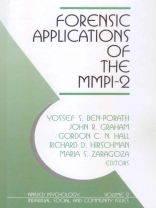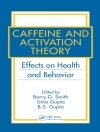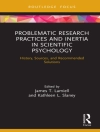This book deals with the forensic application of the MMPI, has been written by experts in the various areas covered, and reviews the whole field critically. The book covers areas such as competency to stand trial, criminal responsibility, injury litigation, child custody evaluation, neuropsychological evaluation, and risk assessment. Several writers include case illustrations in their surveys. The book can be used as a general reference book in what is becoming a new speciality that is rapidly growing, and clinicians and practitioners will undoubtedly find it interesting and illuminating. Its greatest usefulness may lie in . . . detection of response bias, an ever-present problem in forensic affairs. –H. J. Eysenck in The European Journal of Psychological Assessment ‘This is an excellent book, which provides the reader with great insight into the varied forensic applications of the MMPI-2. The strengths and limitations of the instrument in different applications are discussed. The chapters are of consistently high quality and are written by eminent researchers. The authors show that the MMPI-2 provides a sound instrument which can be used in the assessment of a variety of legal issues, but like all psychological instruments it has its limitations and should only be used in conjunction with other forms of assessment and background information. The book shows very clearly how widely used the MMPI-2 has become in forensic applications.’ –Gisle H. Gudjonsson in Personality & Individual Differences Many of the leading North American scholars on the forensic applications of the MMPI-2 join forces in this carefully edited volume to examine and integrate research and practice on the most widely used psychological test in forensic psychology. Valuable chapters investigate the psychological and legal bases of forensic psychological assessment in general and use of the MMPI-2 in particular in a variety of specific forensic applications involving criminal and civil proceedings. The contributors delve into topics, including the use of the MMPI-2 in the assessment of criminal responsibility, in correctional settings, in neuropsychological evaluations, in computer-based evaluations, in child custody evaluations, and more. In light of the recent revision and publication of the MMPI-2 as well as the growing involvement of psychologists in criminal and civil legal proceedings, Forensic Applications of the MMPI-2 provides substantial information to many professionals and scholars who use this vital assessment tool. This volume is an excellent resource for clinical and legal practitioners who wish to keep abreast of state-of-the-art forensic psychological assessment, and is of particular interest to researchers and advanced students in forensic psychology, psychological assessment, criminology, and clinical/counseling psychology, and social work.
Inhoudsopgave
Preface – Yossef S Ben-Porath and John R Graham
Scientific Bases of Forensic Applications of the MMPI-2 – Yossef S Ben-Porath and John R Graham
The Legal Basis of Forensic Applications of the MMPI-2 – James R P Ogloff
Psychometric Issues in Forensic Applications of the MMPI-2 – Irving B Weiner
Detecting Distortion in Forensic Evaluations with the MMPI-2 – David T R Berry
Use of the MMPI-2 in the Assessment of Criminal Responsibility – Richard Rogers and Geoffrey R Mc Kee
Use of the MMPI-2 in Correctional Settings – Edwin I Megargee and Joyce L Carbonell
Risk Assessment with the MMPI-2 in Forensic Evaluations – Kirk Heilburn and Alfred B Heilburn Jr
Personality Patterns of Personal Injury Litigants – James N Butcher
The Role of Computer-Based MMPI-2 Evaluations
Use of the MMPI and the MMPI-2 in Forensic Neuropsychological Evaluations – Linda D Nelson
Use of the MMPI-2/MMPI-A in Child Custody Evaluations – Randy K Otto and Robert P Collins
Forensic Applications of the MMPI-2 – John R Graham, Yossef S Ben-Porath and Kathleen P Stafford
Current Status and Future Directions
Over de auteur
Yossef S. Ben-Porath, Ph D, is a Professor of Psychology at Kent State University. He received his doctoral training at the University of Minnesota and has been involved extensively in MMPI research for the past 24 years. He is a co-developer of the MMPI-2-RF and co-author of test manuals and numerous books, book chapters and articles on the MMPI test. His recent book, Interpreting the MMPI-2-RF provides detailed and practical instruction for interpreting the MMPI-2-RF, the most recent version of the MMPI for adults. He is Associate Editor of Psychological Assessment, and a member of the editorial board of several psychology journals. His clinical practice involves consulting to agencies that screen candidates for public safety positions and conducting criminal court ordered forensic psychological evaluations.












